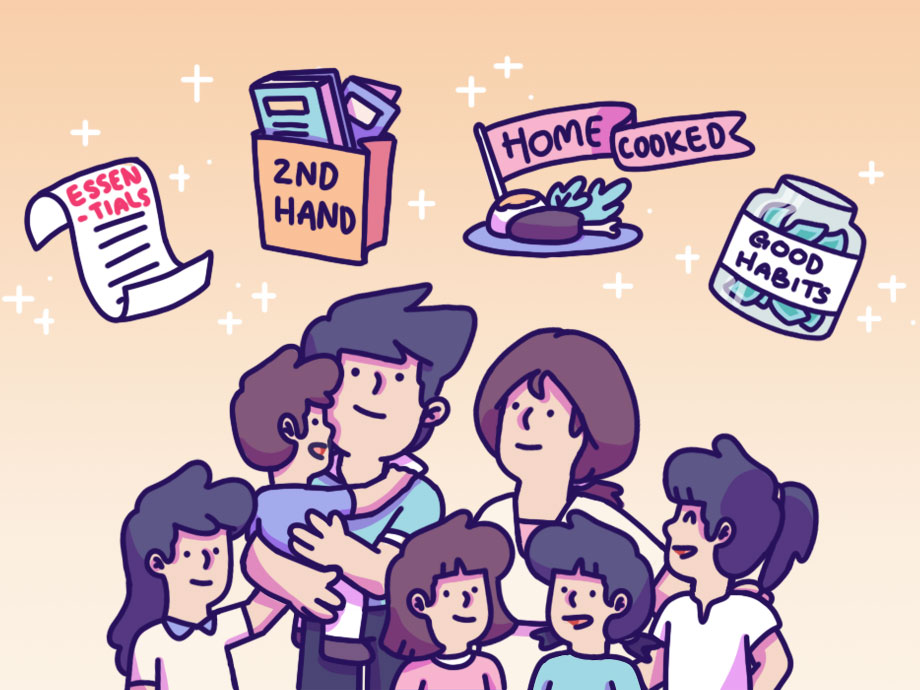Budgeting | Life | Personal Finance | Relationships & Family | Article
How I Walk The Tightrope Challenge Of Balancing Family With My Individual Goals As A Filipino
by The Simple Sum | October 17, 2024

Growing up with a large extended family has been one of life’s greatest joys. My cousins and I would climb trees in the summer while our parents chatted over merienda and kapeng barako. There were weekends with grandparents, karaoke sessions during celebrations, and a house full of laughter and countless memories.
Aside from good times, we also stuck together through challenges. Our Titos and Titas helped my siblings and I get through school when Papa passed away. Those abroad sent remittances for our tuition fees and allowances. Our relatives who lived close to us would send food and pass on school uniforms from older cousins so we didn’t have to spend on new ones.
So when I started working, I became responsible for getting my younger siblings through school, as well as extending financial assistance to our relatives in need. It has become a constant tightrope walk of balancing family responsibilities and working towards my own goals as a young professional.
Balancing family and individual goals
Family always comes first. This is a core value in most Filipino households as we prioritize the collective good of the family unit. Parents work hard, often taking on multiple jobs, to be able to provide for their children. Sometimes their own parents are also financially reliant on them as benefits for the elderly are limited in the Philippines. The so-called sandwich generation, many people are unable to put themselves first due to the pressures of supporting other family members.
We also have this concept of utang na loob which holds us in debt to our parents and other family members who provided support in the past. There’s the unspoken obligation to repay them in the future, or be the ones supporting the younger generation later on as a way of paying it forward.
As much as Filipinos are family-centered and willing to extend a helping hand, there are implications to the individual’s financial, social and emotional security especially given the uncertainties we navigate today.
Related
Emotional toll is real
The stress of juggling finances and family needs can take a toll on your well-being. After every payday, I divide my salary to cover household expenses, education, insurance, allowances for my siblings, then save whatever is left. I am still building out my emergency fund, so I constantly worry there might be accidents or illnesses that befall me or my family. I worry that the unexpected medical bills would wipe away all my savings and might not even be enough.
There’s also the shame of not being able to provide for my family nor repay them for their sacrifices. Due to the patriarchal nature of Filipino society where we pay respect to our elders, it can cause strain within the family if older members perceive that the younger ones have no utang na loob.
Given the close-knit nature of Filipino families, financial woes can breed resentment between people. One of our Titas no longer attends family gatherings because she’s struggling financially and could not repay her debt to another relative. It also puts the burden on the lender to be patient and understanding if the other person could not repay on time, even if the lender also needs to use the money for something else.
Financial Implications to my own savings
Worry and fear can prevent you from taking on more risks and fostering an abundance mindset. I feel like I couldn’t make mistakes at work or else I will get fired or laid off, so I volunteered to take on more work despite the frustrations. This can also limit career options – for example, I’m less willing to leave my stressful but well-paying job to explore other opportunities, even if those could be more impactful or have higher long-term growth potential.
Because I support my family, I can’t invest as much as I would like into my portfolio, or perhaps pursue a business venture because my risk appetite is low.
As for retirement, I haven’t begun to think about my retirement 20 or 30 years from now because I am too focused on the now. The money being used to support family members is money I can’t save for retirement, so I’m unable to put more funds in high-yield savings accounts nor take advantage of compound interest to let my funds grow overtime.
Compared to peers who don’t have familial obligations, they’re able to take more risks like starting a business with friends, or switch careers that are more in line with their passions even if the initial pay is lower.
Related
Unity through thick and thin
Despite the challenges, supporting my family is a burden I’m willing to carry as we stick together through thick and thin. The solution, I believe, is in open communication and collaboration to achieve financial stability.
We need to have honest conversations about our financial situations, even if it’s sometimes difficult to open up to your family about your goals and anxieties. As a young professional navigating adulthood, I’m still trying to understand my financial priorities. I need to work on the financial foundations first, and I have to be open about my limitations.
We can empower our relatives to earn extra income by taking advantage of online work opportunities and free educational resources. I encourage my siblings to have side-hustles and refer my relatives’ businesses to my network for more customers. I also share free online courses with my cousins to equip them with valuable skills for the workforce.
Providing financial assistance to extended families can strengthen bonds and contribute to overall success. Give what you can, save for yourself, have honest conversations, and share resources. Family unity is not just for easy times but is strengthened through hard times together.


















